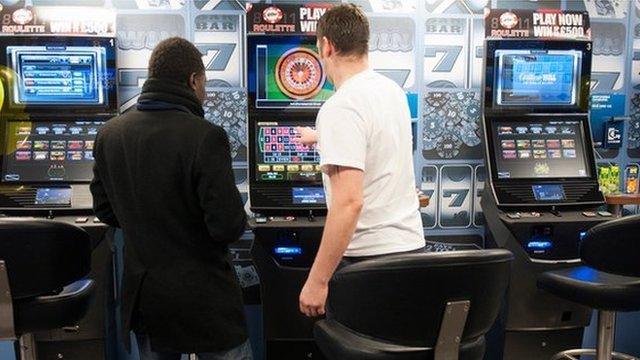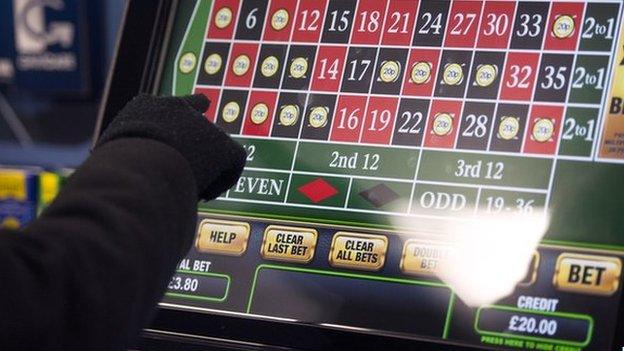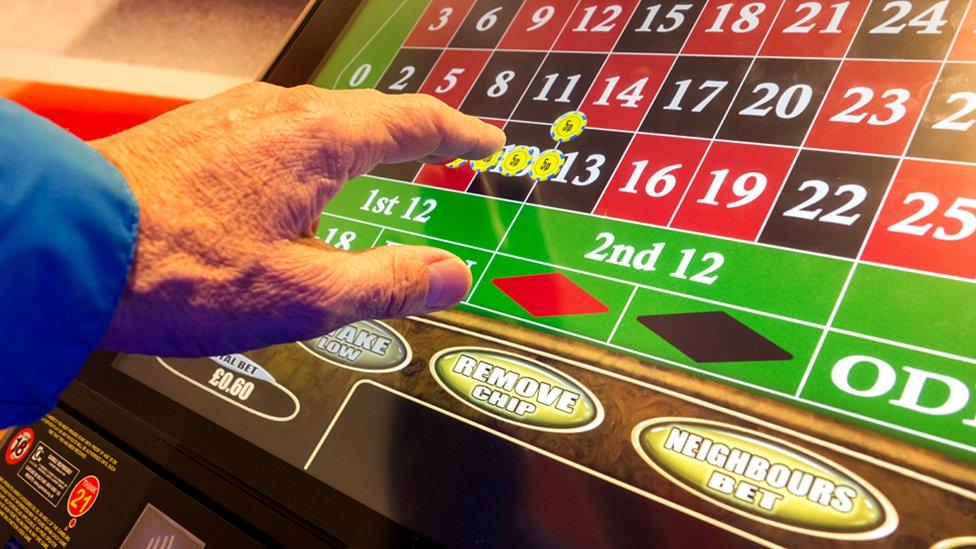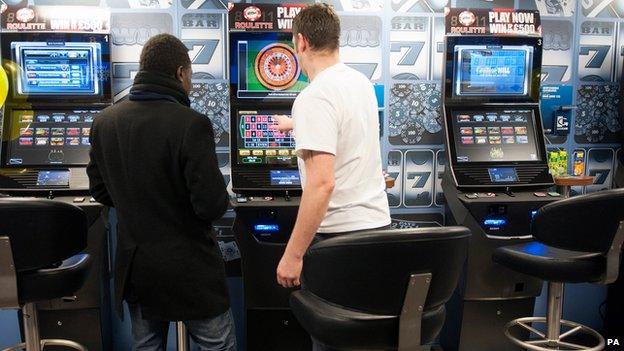Betting machine gamblers 'offered perks'
- Published
Former betting shop manager: High-stakes machine players 'treated like gods'
Betting shop staff say they are told to offer gamblers perks to keep them playing on fixed-odds betting machines, a BBC investigation has found.
One ex-manager said he was instructed to offer free bets and drinks - in one case it was suggested he could buy lunch for high-spending customers.
Other managers we spoke to said they were paid a bonus if they met financial targets on the machines.
The industry says it takes responsible gambling very seriously.
Fixed Odds Betting Terminals (FOBT) offer simple touch screen play, usually on a version of roulette, where people can gamble as much as £100 per spin, in theory every 20 seconds.
'Gods of the shop'
"John", who was a manager at Coral until recently, said staff were given instructions to offer machine players refreshments as soon as they entered the shop and do "absolutely anything" to make them feel comfortable.
"If the shop was too hot for them, we would have to turn the heating down or vice versa. They were the gods of the betting shop," he said.
"There was a suggestion from the area manager at one time that if we had a customer coming in their lunch hour, we had to make sure they didn't waste time trying to get a cheese and ham roll instead of playing the machines. You could go out there, buy them a cheese and ham roll and get it ready for them."
Coral said it takes its commitments to responsible gambling "extremely seriously". It added it had "strengthened protections for all its customers, providing help and support for the very small minority that may have issues with their gambling activity".
Nick Eardley explains how FOBT machines work
John said managers had to hit their machine profit target and would receive a financial reward if they did.
"I know another firm based their whole wage on how much money they made on machines, so there was every incentive for the staff to encourage people," he said.
'Use a hook'
The two store managers, who still work for Coral, said they felt pressure to hit financial targets on the FOBTs machines.
One passed on internal emails from Coral's central operations department about a new FOBTs game called Big Banker, which gave advice on "smashing your targets".
It said: "Ensure your team has… identified your target key customers to demonstrate our popular feature game. Offer a demo to all of your machine customers to whet their appetite, then encourage them to play with their own money.
"Once you have identified your target customers, it often helps when you use a 'hook' to encourage them to play. 'You like Big Banker, do you have our bonus card yet? It's quick, it's easy and it's free.'"

Case study: 'Red mist' of gambling
Tony Franklin has had a problem with gambling since he was a child. He had managed to stay out of the bookies for a year, but over a couple of hours 18 months ago, he blew it all.
Having avoided high-street bookmakers for a year, he cleaned out his bank account in just an hour after a trip to the barbers. As he left he was drawn to one of the many betting shops on his high street and one of its FOBTs.
"I was totally devastated and just completely caught up in the gambling, in the red mist of it," he says.
His addiction has had a devastating effect on his personal relationships. He had been due to bring his wife and child over to the UK to set up home but his expensive relapse put his plans on indefinite hold.
Now Tony keeps his betting shop receipts from that day as a reminder of how quickly he can lose control when faced with temptation. He feels the industry should be doing more to stop addicts like him losing control.

Under the industry's code of conduct, all staff should be trained to identify and help problem gamblers.
But one woman, who works for another unnamed bookmakers, said that did not always happen.
"I have never actually been trained. All we have is a leaflet and are told to give them out if we feel people have a problem. But working on your own at night, or even in the morning, makes it extremely hard to hand out leaflets and speak to customers who are clearly frustrated," she said.
Malcolm George, from the Association of British Bookmakers, said: "It is absolutely the case that anyone joining and working in a betting shop will receive training about problem gambling."
Coral said it rejected the allegations made by the BBC.
It added in its statement: "Recent health surveys show that problem gambling rates have in fact fallen since the introduction of FOBTs and the average Coral customer's loss per session on a FOBT is around £6-9.
"The introduction of supervised stakes above £50 from April last year has had a profound change in customer behaviour, with an approximate 70% reduction in stakes above that level.
"Training, tools and processes are in place throughout the business to ensure that potential problem gamblers are identified and protected."
The Victoria Derbyshire programme is broadcast on weekdays between 09:00-11:00 on BBC Two and the BBC News Channel.
- Published13 June 2016

- Published26 August 2015

- Published26 August 2015

- Published16 July 2015

- Published18 June 2013
